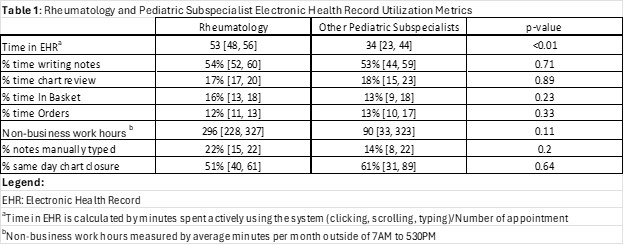Session Information
Session Type: Poster Session A
Session Time: 10:30AM-12:30PM
Background/Purpose: Excessive interaction with the electronic health record (EHR) is frequently cited as a common source of physician burnout. The administrative burden and extended documentation time required by EHR systems can significantly contribute to physician fatigue and discontent. This study evaluated EHR utilization across pediatric subspecialties.
Methods: This is a cross-sectional study evaluating EHR utilization data from 8 pediatric subspecialties at a quaternary medical center. Three months of outpatient EHR provider action logs from spring 2024 were evaluated. We assessed factors associated with EHR utilization including the percentage of time reviewing the chart, writing notes, addressing in-basket tasks, managing orders as well as measures of efficient EHR usage including the percentage of notes manually typed, percentage of same day chart closure, and the use of efficiency tools were recorded. Time actively using the EHR was normalized by number of clinic appointments. Non-business work hours were measured by average minutes per month utilizing the EHR outside of 7AM to 530PM. Providers were stratified by greater than or less than 5 half-day sessions of clinic per week to assess differences in EHR utilization based on clinical load. Summary statistics are reported. Comparisons were made between groups using Wilcoxon rank-sum test.
Results: 127 provider logs were assessed across 8 specialties, with a median of 17 [10, 33] providers per specialty. Nine pediatric rheumatologists spent a median of 53 [48, 56] minutes within the EHR per patient appointment, whereas other subspecialists spent a median of 34 [23, 44] minutes (p< 0.01) (Table 1). The percentage of time completing non-documentation tasks within the EHR and rates of same day chart closure were similar between rheumatology and other subspecialists. The use of diagnosis and level of service speed buttons, quick actions, and chart review filters did not differ between rheumatologists and other subspecialists. All rheumatologists but only 68% of other subspecialists utilized chart search (p=0.04). There was no difference in EHR utilization metrics when stratifying by the number of clinic sessions within subspecialty departments (Table 2).
Conclusion: Pediatric rheumatologists spend significantly more time per appointment within the EHR than other subspecialty providers, and the majority of this extra time is spent on documentation. Leveraging new tools such as ambient listening and other artificial intelligence tools may lessen documentation burden and improve EHR utilization, potentially decreasing burnout rates and improving workforce retention.
To cite this abstract in AMA style:
Coss S, Brittain A, Lee J, Young J, Stojkic I, Mahan J, Taxter A. Evaluation of electronic health record and efficiency tool utilization by pediatric subspecialists [abstract]. Arthritis Rheumatol. 2025; 77 (suppl 9). https://acrabstracts.org/abstract/evaluation-of-electronic-health-record-and-efficiency-tool-utilization-by-pediatric-subspecialists/. Accessed .« Back to ACR Convergence 2025
ACR Meeting Abstracts - https://acrabstracts.org/abstract/evaluation-of-electronic-health-record-and-efficiency-tool-utilization-by-pediatric-subspecialists/


.jpg)